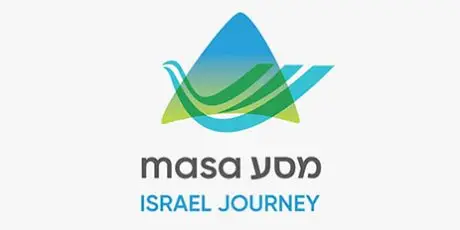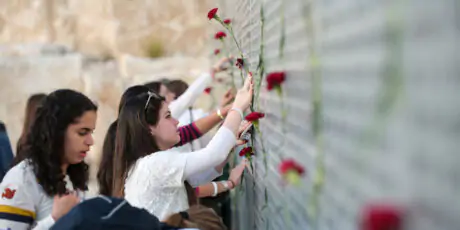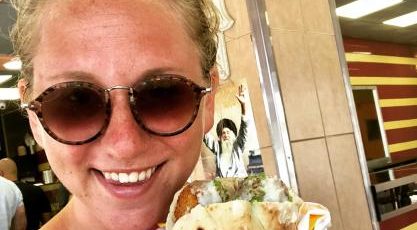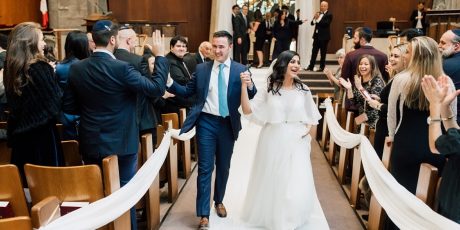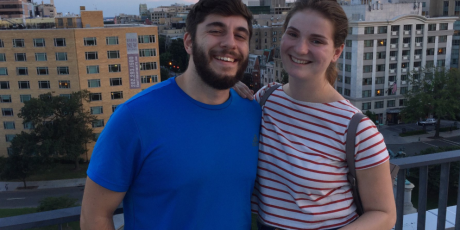By Caline Chitayat

Jamie Gold, a San Fernando Valley native, was 25 years old when she went on Birthright.
“I actually had no desire to [go to Israel], but I was in a job that I couldn’t stand and I wanted to go on vacation,” Gold recalls. A couple of her friends convinced her to join them on the trip to Israel. “I was the naïve person who thought there would be camels everywhere. I really had no concept of Israel; it just wasn’t on my radar.”
When Gold arrived, she says she immediately fell in love with the country.
“The community, the culture, everything just hit me, and I realized I wanted that in my life.”
During her trip, Gold bumped into a girl on another Birthright trip who told her about Masa Israel, a public-service organization that offers unique study, service and career development experiences to young Jewish adults from around the globe. Gold learned of the Masa Israel Teaching Fellows program, which combined what she wanted to do with where she wanted to be, and was very affordable option for a life change. Gold applied to the program and was accepted when she landed back in the U.S. She quit her job and moved to Israel five months later.
“Everything in my life has changed as a result of the program – personally and professionally.”

Masa’s Israel Teaching Fellows program is a 10-month program for college graduates between the ages of 21 and 30. The program allows these graduates to teach English to Israeli students and to immerse themselves in Israeli society. Masa coordinates trips to various destinations around Israel throughout the 10 months. The organization also provides participants with an apartment. Gold lived with five other girls.
“I was in Rishon LeZion. My necklace has the coordinates, so it’s always near my heart,” she says. “In the first month or two, we did ulpan and then [Masa] gave us 100 hours of teaching preparation, in order to make us feel comfortable in the classroom. There was no requirement for going on the program – you didn’t have to have any teaching background at all – so they wanted to make sure all of us were comfortable.”
After the High Holidays, the Teaching Fellows arrived in their classrooms. Most were assigned to elementary school, but Gold landed in a middle school. Her experience was probably different because of that, she says. Gold would take out groups of between eight and 10 students, typically a mix of very advanced English learners and some intermediate ones. The goal was to have the advanced learners motivate the intermediate students.
Although it was a very exciting time, Gold says she thought she was going to quit on the first day.
“The school environment in general is so different. It’s crazy to me because some of the smartest, most innovative people in the world come out of that country.”
She remembers kids running around, throwing things and talking to each other incessantly. It was very different from the way she grew up in California. Gold does note that the students completely respected her. Even though they seemed to look at her as more of a peer, she says she could tell they truly wanted to learn from her.
“It was really cool because they looked at me like I was a gift. If they got chosen to go with me, it was special because not everyone was able to. It was also cool that I didn’t speak a lot of Hebrew because if they wanted to talk to me, then they really had to force themselves to speak English. I found that naturally, they were doing better in their English classes because they wanted to converse.”
Gold was participating in the program during Operation Pillar of Defense through the fall of 2012.
“That was really hard for me. But it was amazing because I got to go and talk to these students and they were having conversations about these really deep, meaningful things. They made me feel better. I was teaching them English, but they were also teaching me.”
At the end of the school year, Gold watched her students go through graduation. The program came to a close, and it was time for her to head back to the States. As exciting as it was to see her family and friends, Gold says it took her many months to adjust back to life on the American West Coast.
“I just feel so much more connected to Israel than to America. I can’t even compare the two,” she says. “Even when I went on Birthright, it felt more like home. I know everybody says that, but it’s true. It’s a feeling that I didn’t have in America.”
In the five months between Birthright and the Teaching Fellows program, Gold sought to find a community like the one she had in Israel.
“I didn’t have a community prior, and I wasn’t involved in a Jewish community by any means. I had a friend who went on Birthright with me and told me we should go to a Moishe House event. I had never heard of [the organization], but I ended up going and it was great because I really connected with the people who lived in the house. I think that’s really important,” she says.
Moishe House is a nonprofit organization that provides a vibrant Jewish community for young adults in their 20s and facilitates a wide range of experiences, so that they have the leadership, knowledge and community to enrich their Jewish journeys.
“I ended up going to all of their events during those few months, and naturally I became friends with them.”
Eventually, Gold heard about an opening at the West L.A. Moishe House, so she moved in and lived there for the next two and a half years. Gold did a teaching program called DeLeT at Hebrew Union College and was able to earn her teaching credential. It was the perfect transition from Masa, where she went from teaching in an informal setting to formally teaching. However, after working in a Jewish day school, Gold realized that while she loved the social and emotional aspects of teaching, she wasn’t set on academics for 40 hours each week.
“While I was in the teaching program realizing I didn’t want to be a teacher, I had all this responsibility as a Moishe House resident. I was planning seven events each month for the community and doing a lot of outreach. I really, really cared about it, and my roommate asked me, ‘What are you not doing this for a job?’ I started thinking about it, and was really passionate about working in the Jewish community.”
Moishe House approached Gold while she was still a resident and informed her of a job opening. After three months, she moved from L.A. to San Diego for the job and has been with them for nine months now.
As Director of Alumni Engagement, Gold is able to reflect on her own experiences as a resident and what she wants from the program as an alumni.
“I love developing and cultivating deep and meaningful relationships. We have 820 alumni at the moment, and we’ll have more alumni than residents soon, so my job is really just to connect with people who have lived in the house and find out what they want to see.”
Gold notes that she feels so lucky because she has the resources now and can bring her own creativity to the job.
“It’s not like a large corporation where if you want to do something, you have to wait. At Moishe House, if they hire you, they trust you and give you that creative freedom. I feel that there is such an untapped market right now that I have so much potential to create so many great things.”
When asked if Gold would ever consider moving back to Israel, she says that if she would go back, she would definitely want to have a purpose for being there.
“The first time it was Masa, but now I’m in a different place in my life, and I would want to have a job lined up there. But yes, I would definitely consider moving back – at least for a short amount of time. Israel will always be my second home, and my kids will be raised with it. It will always be a place that I am constantly thinking about and visiting when I can.”

Originally published in the San Diego Jewish Journal.
